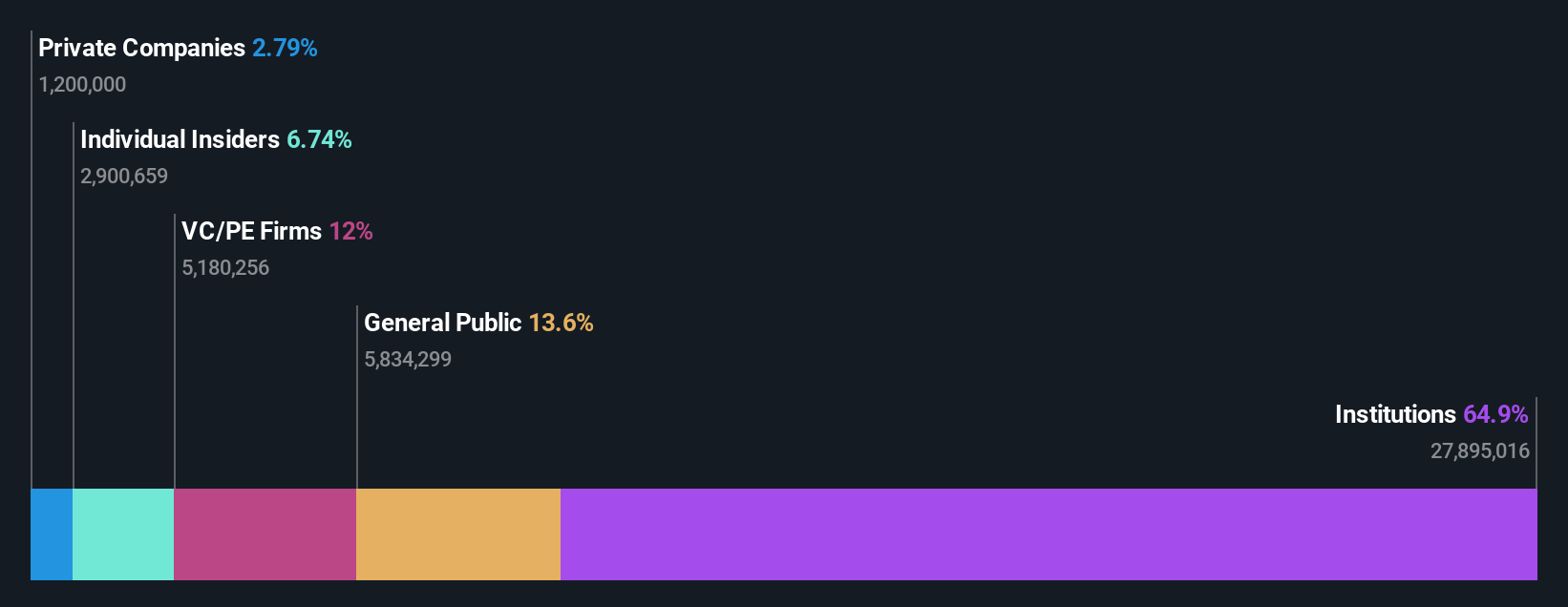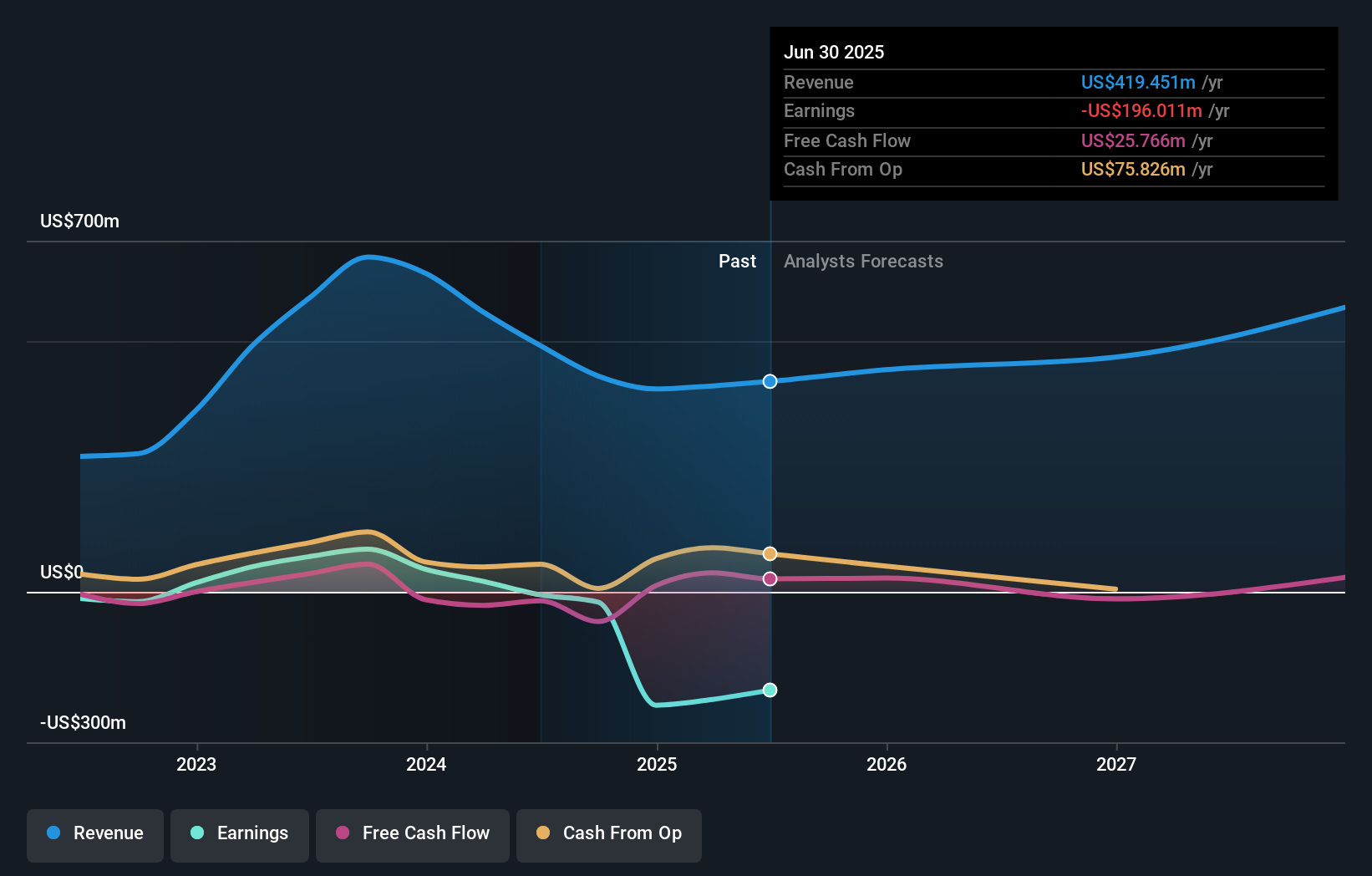- United States
- /
- Renewable Energy
- /
- NasdaqCM:HNRG
Hallador Energy Company's (NASDAQ:HNRG) large institutional owners must be happy as stock continues to impress, up 9.9% over the past week
Key Insights
- Institutions' substantial holdings in Hallador Energy implies that they have significant influence over the company's share price
- A total of 12 investors have a majority stake in the company with 51% ownership
- Recent sales by insiders
To get a sense of who is truly in control of Hallador Energy Company (NASDAQ:HNRG), it is important to understand the ownership structure of the business. We can see that institutions own the lion's share in the company with 65% ownership. That is, the group stands to benefit the most if the stock rises (or lose the most if there is a downturn).
And things are looking up for institutional investors after the company gained US$82m in market cap last week. The one-year return on investment is currently 102% and last week's gain would have been more than welcomed.
In the chart below, we zoom in on the different ownership groups of Hallador Energy.
Check out our latest analysis for Hallador Energy

What Does The Institutional Ownership Tell Us About Hallador Energy?
Institutional investors commonly compare their own returns to the returns of a commonly followed index. So they generally do consider buying larger companies that are included in the relevant benchmark index.
As you can see, institutional investors have a fair amount of stake in Hallador Energy. This suggests some credibility amongst professional investors. But we can't rely on that fact alone since institutions make bad investments sometimes, just like everyone does. When multiple institutions own a stock, there's always a risk that they are in a 'crowded trade'. When such a trade goes wrong, multiple parties may compete to sell stock fast. This risk is higher in a company without a history of growth. You can see Hallador Energy's historic earnings and revenue below, but keep in mind there's always more to the story.

Institutional investors own over 50% of the company, so together than can probably strongly influence board decisions. We note that hedge funds don't have a meaningful investment in Hallador Energy. Looking at our data, we can see that the largest shareholder is Lubar & Co., Inc. with 12% of shares outstanding. The Vanguard Group, Inc. is the second largest shareholder owning 5.2% of common stock, and BlackRock, Inc. holds about 4.9% of the company stock. In addition, we found that Brent Bilsland, the CEO has 3.6% of the shares allocated to their name.
After doing some more digging, we found that the top 12 have the combined ownership of 51% in the company, suggesting that no single shareholder has significant control over the company.
While it makes sense to study institutional ownership data for a company, it also makes sense to study analyst sentiments to know which way the wind is blowing. There are a reasonable number of analysts covering the stock, so it might be useful to find out their aggregate view on the future.
Insider Ownership Of Hallador Energy
The definition of company insiders can be subjective and does vary between jurisdictions. Our data reflects individual insiders, capturing board members at the very least. Management ultimately answers to the board. However, it is not uncommon for managers to be executive board members, especially if they are a founder or the CEO.
I generally consider insider ownership to be a good thing. However, on some occasions it makes it more difficult for other shareholders to hold the board accountable for decisions.
We can report that insiders do own shares in Hallador Energy Company. As individuals, the insiders collectively own US$60m worth of the US$889m company. Some would say this shows alignment of interests between shareholders and the board. But it might be worth checking if those insiders have been selling.
General Public Ownership
The general public-- including retail investors -- own 14% stake in the company, and hence can't easily be ignored. While this size of ownership may not be enough to sway a policy decision in their favour, they can still make a collective impact on company policies.
Private Equity Ownership
With an ownership of 12%, private equity firms are in a position to play a role in shaping corporate strategy with a focus on value creation. Some investors might be encouraged by this, since private equity are sometimes able to encourage strategies that help the market see the value in the company. Alternatively, those holders might be exiting the investment after taking it public.
Next Steps:
It's always worth thinking about the different groups who own shares in a company. But to understand Hallador Energy better, we need to consider many other factors. For example, we've discovered 2 warning signs for Hallador Energy (1 can't be ignored!) that you should be aware of before investing here.
Ultimately the future is most important. You can access this free report on analyst forecasts for the company.
NB: Figures in this article are calculated using data from the last twelve months, which refer to the 12-month period ending on the last date of the month the financial statement is dated. This may not be consistent with full year annual report figures.
Valuation is complex, but we're here to simplify it.
Discover if Hallador Energy might be undervalued or overvalued with our detailed analysis, featuring fair value estimates, potential risks, dividends, insider trades, and its financial condition.
Access Free AnalysisHave feedback on this article? Concerned about the content? Get in touch with us directly. Alternatively, email editorial-team (at) simplywallst.com.
This article by Simply Wall St is general in nature. We provide commentary based on historical data and analyst forecasts only using an unbiased methodology and our articles are not intended to be financial advice. It does not constitute a recommendation to buy or sell any stock, and does not take account of your objectives, or your financial situation. We aim to bring you long-term focused analysis driven by fundamental data. Note that our analysis may not factor in the latest price-sensitive company announcements or qualitative material. Simply Wall St has no position in any stocks mentioned.
About NasdaqCM:HNRG
Hallador Energy
Through its subsidiaries, engages in the production of steam coal for the electric power generation industry in Indiana.
Excellent balance sheet and good value.
Similar Companies
Market Insights
Community Narratives



